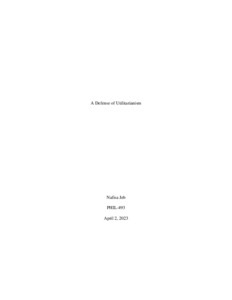| dc.rights.license | In Copyright | en_US |
| dc.creator | Jeb, Nafisa | |
| dc.date.accessioned | 2023-09-04T17:04:13Z | |
| dc.date.available | 2023-09-04T17:04:13Z | |
| dc.date.created | 2023 | |
| dc.identifier | WLURG038_Jeb_PHIL_2023 | |
| dc.description | Honors thesis; [FULL-TEXT FREELY AVAILABLE ONLINE] | en_US |
| dc.description | Nafisa Jeb is a member of the Class of 2023 of Washington and Lee University. | en_US |
| dc.description.abstract | I will attempt to defend utilitarianism from the demandingness objection. The sort of utilitarianism that I refer to throughout is the consequentialist moral theory that obligates us to maximize well-being. The form of utilitarianism I refer to is hedonistic, so maximizing well-being is done by maximizing happiness. Each action may be judged based on whether it was the best action to be taken for achieving the happiest state of affairs. This kind is distinct from rule utilitarianism. Rule utilitarianism refers to the consequentialist theory where we ought to maximize well-being, but the right action adheres to a justified moral rule, and the rule is one such that it would maximize happiness if everyone followed it. The kind of utilitarianism I refer to is also maximizing: the obligation, no matter how stringent, will not be satisfied without being entirely fulfilled. If you are obligated to donate all your time and money to save children in some distant country, then donating some money and volunteering some time is not enough to satisfy the obligation. Some philosophers refer to a kind of satisficing utilitarianism in which our obligations may be reduced (say, your obligation would be to give 10% of your income rather than your entire livelihood to charity). These philosophers acknowledge more good can be done, but doing more is not quite required. I do not wish to address rule or satisficing utilitarianism, so the kind I refer to is act, hedonistic, maximalist utilitarianism. [From introductory section] | en_US |
| dc.format.extent | 27 pages | en_US |
| dc.language.iso | en_US | en_US |
| dc.rights | This material is made available for use in research, teaching, and private study, pursuant to U.S. Copyright law. The user assumes full responsibility for any use of the materials, including but not limited to, infringement of copyright and publication rights of reproduced materials. Any materials used should be fully credited with the source. | en_US |
| dc.rights.uri | http://rightsstatements.org/vocab/InC/1.0/ | en_US |
| dc.subject.other | Washington and Lee University -- Honors in Philosophy | en_US |
| dc.title | A Defense of Utilitarianism (thesis) | en_US |
| dc.type | Text | en_US |
| dcterms.isPartOf | RG38 - Student Papers | en_US |
| dc.rights.holder | Jeb, Nafisa | |
| dc.subject.fast | Utilitarianism | en_US |
| dc.subject.fast | Hedonism -- Moral and ethical aspects | en_US |
| dc.subject.fast | Philosophy | en_US |
| local.department | Philosophy | en_US |
| local.scholarshiptype | Honors Thesis | en_US |
